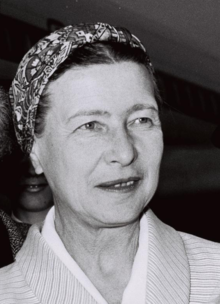Simone de Beauvoir
| Simone de Beauvoir | |
|---|---|
 De Beauvoir in 1967 | |
| Kamundagan | Simone Lucie Ernestine Marie Bertrand de Beauvoir 9 Enero 1908 Paris, France |
| Kagadanan | 14 Abril 1986 (edad 78) Paris, France |
| Alma mater | University of Paris (B.A., M.A.) |
| Kasaroan | Jean-Paul Sartre (1929–1980; his death) Nelson Algren (1947–64) Claude Lanzmann (1952–59) |
| Era | 20th-century philosophy |
| Region | Western philosophy |
| School | |
Main interests | |
Notable ideas | |
| Lagda | |
Simone Lucie Ernestine Marie Bertrand de Beauvoir (/də ˈboʊˌvwɑːr/;[2] French: [simɔn də bovwaʁ] (listen); Enero 9, 1908 – Abril 14,1986) sarong parasurat sa Pransya , intelektuwal, pilosopong eksistensyalista, aktibistang politikal, feminista asin teorikong sosyal. Dawa dae niya kinukonsidera an saiyang sadiri na pilosopo, igwa siyang importanteng impluwensya sa feminist existentialism asin feminist theory.[3]
Si De Beauvoir nagsurat nin mga nobela, sanaysay, mga biograpiya, sadiring talambuhay asin mga monograp manungod sa pilosopiya, politika asin mga isyung sosyal. Midbid siya sa 1949 treatise na The Second Sex, an detalyadong analysis kan pang-aapi sa mga kababaihan asin foundational tract kan kontemporaryong peminismo; asin an saiyang mga nobela kabali na an She Came to Stay asin The Mandarins. Midbid man an saiyang relasyon sa sarong pilosopong Pranses na si Jean-Paul Sartre.


Mga Gibo
[baguhon | baguhon an source]Listahan nin mga publikasyon (bakong kompleto)
[baguhon | baguhon an source]- L'Invitée (1943) (English – She Came to Stay) [novel]
- Pyrrhus et Cinéas (1944) [nonfiction]
- Le Sang des autres (1945) (English – The Blood of Others) [novel]
- Who Shall Die? (1945)
- Tous les hommes sont mortels (1946) (English – All Men Are Mortal) [novel]
- Pour une morale de l'ambiguïté (1947) (English – The Ethics of Ambiguity) [nonfiction]
- "America Day by Day" (1948) (English – 1999 – Carol Cosman (Translator and Douglas Brinkley (Foreword) [nonfiction]
- Le Deuxième Sexe (1949) (English – The Second Sex) [nonfiction]
- L'Amérique au jour le jour (1954) (English – America Day by Day)
- Les Mandarins (1954) (English – The Mandarins) [novel]
- Must We Burn Sade? (1955)
- The Long March (1957) [nonfiction]
- Memoirs of a Dutiful Daughter (1958)
- The Prime of Life (1960)
- Force of Circumstance (1963)
- A Very Easy Death (1964)
- Les Belles Images (1966) [novel]
- The Woman Destroyed (1967) [novel]
- The Coming of Age (1970) [nonfiction]
- All Said and Done (1972)
- Old Age (1972) [nonfiction]
- When Things of the Spirit Come First (1979) [novel]
- Adieux: A Farewell to Sartre (1981)
- Letters to Sartre (1990)
- Journal de guerre, Sept 1939–Jan 1941 (1990); English – Wartime Diary (2009)
- A Transatlantic Love Affair: Letters to Nelson Algren (1998)
- Diary of a Philosophy Student, 1926–27 (2006)
- Cahiers de jeunesse, 1926–1930 (2008)
Mga toltolan
[baguhon | baguhon an source]- ↑ Wendy O'Brien, Lester Embree (eds.), The Existential Phenomenology of Simone de Beauvoir, Springer, 2013, p. 40.
- ↑ "de Beauvoir, Simone". Oxford American Dictionary. Archived from the original on 2017-02-11. Retrieved 2019-04-01.
- ↑ Bergoffen, Debra, "Simone de Beauvoir", The Stanford Encyclopedia of Philosophy (Fall 2010 Edition), Edward N. Zalta (ed.), URL = <http://plato.stanford.edu/archives/fall2010/entries/beauvoir/>.
